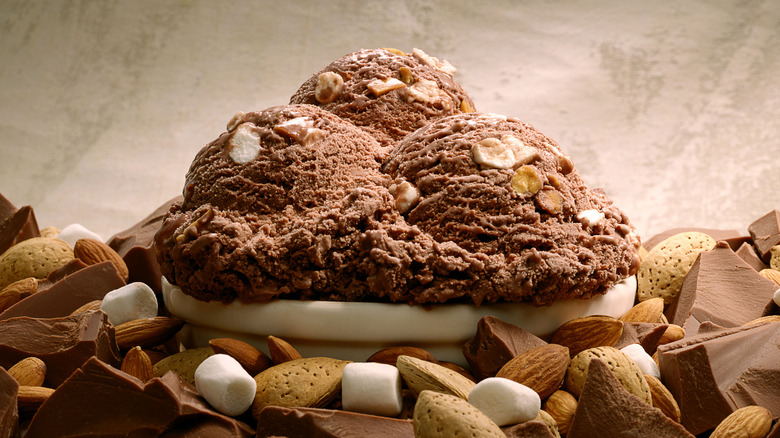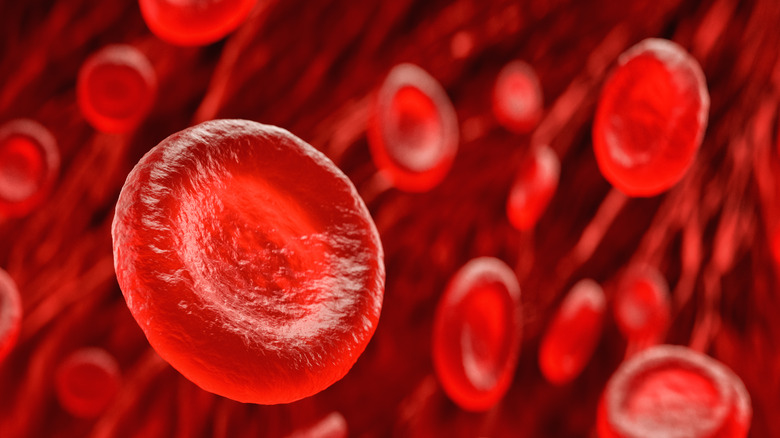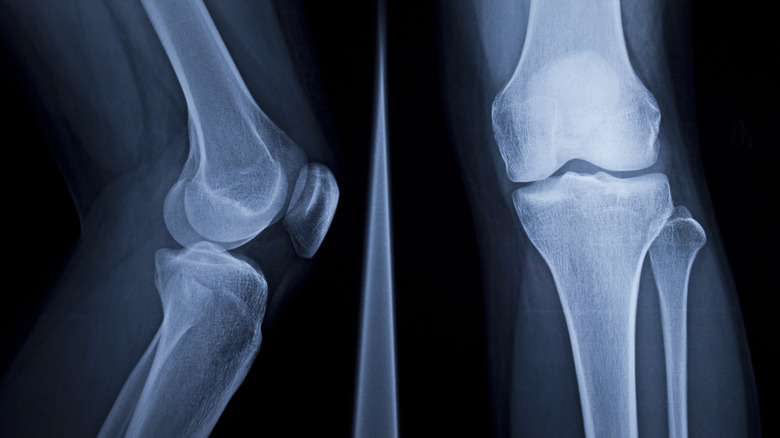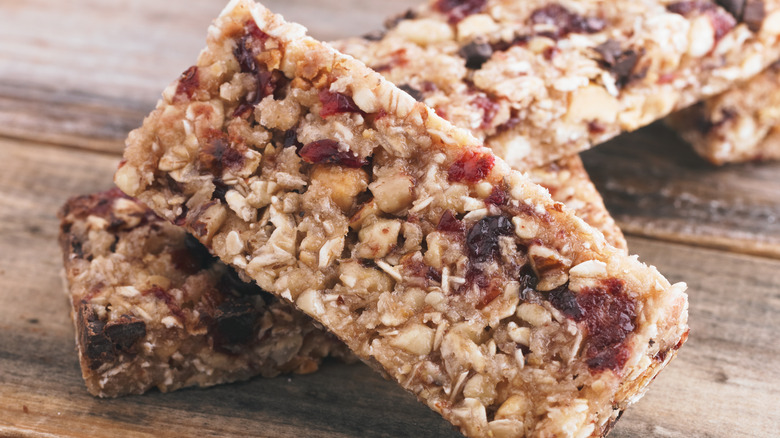Unexpected Health Benefits From Eating Ice Cream
Is there anything more delicious than the nights you get to put on your coziest sweatpants and curl up on the couch with a bowl of your favorite ice cream? In a perfect world, a heaping mound of ice cream would be considered a balanced and healthy meal, and kale would be the number one cause of weight gain. But alas, a perfect world it is not. Instead, we are constantly inundated with the unfortunate information that sugary snacks can take a toll on our health. But what if we were to tell you that there are some real health benefits to be gained from indulging in one of the world's favorite sweet treats?
Naturally, any of the health benefits ice cream has to offer should be considered alongside its drawbacks. Healthline details how ice cream is high in added sugars and calories, noting that many brands contain 12-24 grams of added sugar per half a cup. That means a single serving puts you well on your way toward the daily recommended limit of 50 grams of sugar for a 2,000 calorie diet. Nonetheless, to say that ice cream is totally void of nutrition would be incorrect, and leaning into that fact just feels right. Keep reading for the scoop on the unexpected health benefits of ice cream.
How is ice cream different from other dairy desserts?
What is ice cream, exactly? After all, if you're not too discerning, it might seem like a frozen dessert is a frozen dessert. But according to U.S. Dairy, there's a specific definition of ice cream that differentiates it from, say, gelato or a plant-based (non-dairy) alternative.
By definition, ice cream is made from milk, cream, or some combination with either ingredient. The important thing is that it has to have at least 10% milkfat, per the rules of the United States Department of Agriculture. Therefore, a product made with non-fat milk and vegetable oil, for example, would not be considered ice cream. Ice cream is also made with some kind of sweetener (usually sugar) and flavorings, plus stabilizers to give it a smoother texture. This makes ice cream distinct from similar frozen dairy desserts like gelato, which does not have as high a fat content, or sherbet, which has a fat content as low as 1-2% instead of ice cream's 10%.
Ice cream is energy-dense
The first thing you should know about ice cream is that it is energy dense — in other words, it has a lot of calories for only a small portion size. This can be great if you're trying to get as many calories as you can (maybe you're training heavily for a sport, or you're trying to put on weight), though people who are watching their energy intake will need to stick with smaller portion sizes.
According to Eat This Much, a single cup of vanilla ice cream has more than 270 calories, mostly from its 14.5 grams of fat but also from its 31.2 grams of carbohydrates, including 28 grams of sugar. The National Health Service of the United Kingdom notes that this kind of energy from food, which is measured in calories, is vital for daily activities and bodily function, but more calories than we use will result in weight gain.
Ice cream has vitamin A for improved vision
If you're looking at the vitamin and mineral profile of ice cream, one thing you might notice is the amount of vitamin A it contains — almost 18% of your daily need (via Eat This Much). That's great, because vitamin A plays many important roles in your body, as the Mayo Clinic explains. Most notably, it's good for your eye health.
Getting enough vitamin A can help reduce your risk of age-related macular degeneration, a disease in which your retinas deteriorate and your vision becomes blurry. You also need vitamin A to improve your immunity, so your body can fend off sickness. In fact, vitamin A is an antioxidant that can help fight the free radical damage in your body that can lead to diseases like cancer.
In addition to dairy products like ice cream, vitamin A can be found in spinach and other leafy greens, as well as carrots and cantaloupe. Although vitamin A deficiency is not very common, it's always good to know you're getting a vital nutrient from a food you love, like ice cream.
Ice cream has B12 for red blood cell formation
Here's an important vitamin that you don't want missing from your diet: vitamin B12. And the thing is, vitamin B12 deficiency isn't completely uncommon, according to Medical News Today. This might have something to do with the fact that vitamin B12 is found only in animal-based foods, such as dairy, so people who are eating a plant-based diet might be having trouble getting as much vitamin B12 as they need. As many as 20% of adults older than 60 in the United States and the United Kingdom don't get enough vitamin B12, though that number is much lower (only 6%) in the under-60 population.
Vitamin B12 is necessary for proper function of your brain and nervous system. You also need it for your body to create red blood cells to deliver oxygen to different parts of your body. Without vitamin B12, you're going to feel pretty tired — and if the deficiency gets too bad, you could develop a neurological problem. But the good news is that the 1-cup serving of ice cream you like to enjoy has 22% of your daily recommended vitamin B12 dose (via Eat This Much).
Ice cream has calcium for strong bones
When you think of dairy products, what nutrient comes to mind? If you're like most people, you're probably thinking of calcium, a mineral that's necessary for building (and maintaining) strong bones and teeth.
But in addition to strong bones, calcium benefits your body by helping your muscles contract and even clotting your blood when you have an injury, according to the National Health Service. Without sufficient calcium, you could put your skeletal system at risk — children are prone to developing rickets, while older populations are at risk for osteoporosis.
Although you can get calcium from all dairy products (think milk, yogurt, cheese, and so forth) as well as leafy greens (like kale or fortified grain products), you shouldn't overlook the calcium found in ice cream. One cup of ice cream has 169 milligrams of calcium, which is about 17% of your body's daily needs (via Eat This Much).
Ice cream has vitamin D for preventing cancer growth
Another nutrient found in many dairy product is Vitamin D. It is also known as the "sunshine vitamin," because our bodies are able to naturally produce vitamin D when we are exposed to the sun's rays.
Like calcium, vitamin D is necessary for building strong, healthy bones, but there's another important reason for getting sufficient amounts of vitamin D: Scientific research has indicated that it can inhibit the growth of cancer cells in your body, according to Harvard Medical School. Unfortunately, many people don't get enough vitamin D.
You can avoid vitamin D deficiency by eating seafood like salmon, tuna, and swordfish, but you can also look for foods that are fortified with vitamin D, such as orange juice and dairy products. According to FitBit, a half-cup serving of ice cream naturally has just 6% of your daily needed vitamin D, so look for ice cream made from fortified milk if you can find it.
Ice cream has potassium for fluid balance
Bananas get a lot of hype when it comes to being a source of potassium, but these fruits are far from the only food to provide this mineral. Dairy products, including ice cream, are also great sources.
A half-cup of ice cream has a little more than 129 milligrams, about 4% of your daily needs (via FitBit). This can be beneficial when you're eating ice cream on a hot summer day (when you're likely to be sweating heavily), as potassium is an electrolyte that ensures proper fluid balance in your body. Specifically, potassium is what draws water into your cells, balancing out the effects of sodium, which draws water out of your cells, as Harvard Medical School explains. (And if you're sweating heavily, you want to make sure you're replenishing those electrolytes in your body!)
Potassium is also important for maintaining healthy blood pressure, and if your intake of sodium is much higher than your intake of potassium, it can put you at risk for poor cardiovascular health. It should be noted that many fruits and vegetables are much better sources of potassium — including avocado, broccoli, winter squash tomatoes, and lentils — but you do get some from ice cream as well.
Ice cream boosts your mood
Do you ever feel as if you just become happier when you're eating ice cream? That's not just you imagining things — it actually might be something you can explain with science.
The Guardian reports that neuroscientists studying the brain saw that when people ate ice cream, this stimulated the orbitofrontal cortex, described by one of the researchers as the "happy zone of the brain." It's almost as if eating ice cream is an exciting moment in your day. Other health experts point to a similar notion in the way ice cream can prompt your body to release endorphins, neurotransmitters that relieve your body from stress and physical pain.
Slidell Memorial Hospital lists ice cream, along with other snack favorites like fries and chocolate, as a food that can make you feel a little less stressed. The only problem is that relying on this method too often can be detrimental to your heart health and weight management — so while having an occasional ice cream cone can be beneficial, it shouldn't be your go-to for an emotional boost.
Ice cream is more nutritious than a granola bar
When ranking snack options in terms of how healthy they are, most people would probably guess that a granola bar packs more nutrients than ice cream. After all, granola is made of whole grains, but ice cream is full of saturated fat and sugar, so the granola bar absolutely must be healthier, right?
Interestingly, that's not the case according to the Food Compass Score, which assesses foods based on factors like their ingredients and the nutrients they provide. As the Daily Mail reports, the Food Compass ranks an ice cream cone as a better option than a granola bar, presumably because granola bars contain a surprising amount of sugar and very little protein. On the other hand, that ice cream cone has protein, calcium, and other nutrients that make it more appealing.
It's worth noting that this is based on a portion-controlled amount of ice cream — that cone holds only one scoop of ice cream, so the score could be slightly different if you were to eat three or four scoops.
Moderate ice cream consumption won't cause heart problems
Most people have heard of "good fat" and "bad fat," and unfortunately, the fat from ice cream falls into the latter category. According to Harvard Medical School, the fat in dairy foods like ice cream is different from the plant-based fats in foods like avocados, nuts, and olive oil. That's because ice cream has saturated fat, which can raise your blood cholesterol levels, as opposed to the monounsaturated and polyunsaturated fats in those plant-based foods.
But just because ice cream has saturated fat doesn't mean you need to avoid it entirely. The Heart Foundation actually states that evidence shows dairy foods very likely don't have any negative effect on your heart health — and that, believe it or not, you can eat foods like ice cream as part of a heart-healthy diet. The key is to choose low-fat or reduced-fat dairy options as often as possible, or if you opt for the full-fat versions, to limit the amount of dairy in your diet. That way, you can enjoy ice cream to your heart's content without hurting, well, your heart.
Ice cream keeps you satiated
The fat found in dairy products does serve a purpose in your diet. In a list of all the ways that dietary fat benefits you, Today points out that fat is what helps you feel full — and it keeps you feeling full until your next meal. The list encourages consumption of heart-healthy unsaturated fats for this purpose, but ice cream can still be an option.
About 25-35% of your total caloric intake should come from fat, but not all of that should be saturated fat like that found in ice cream. When it comes to saturated fat, the American Heart Association recommends you yield no more than 5% or 6% of your daily calories. Ice cream has about 8.6 grams of fat per half-cup, and of that fat, 5.2 grams of it is saturated (via FitBit). Therefore, if you eat a 2,000-calorie diet, you can enjoy that half-cup of ice cream, as long as you watch your saturated fat consumption during other meals.
Ice cream might help with fertility
What if ice cream could help you conceive a baby (and not just a food baby, but an actual baby baby)?
There's scientific research that shows this could be a possibility, but health experts are encouraging some discretion when it comes to interpreting these findings. NBC News highlights a study showing women who ate low-fat dairy products had more trouble conceiving compared with women who ate fatty dairy products. Specifically, when it came to ice cream, women eating the sweet treat twice a week (or even more frequently) had a lower risk of infertility — by as much as 38% — when compared with women who were eating it less than once a week.
However, doctors emphasize that this research shouldn't be a reason to eat an unhealthy amount of ice cream or similar foods. You still need to keep your consumption of saturated fat in check. But if you opt to have a serving of a high-fat dairy food you love every day (such as a scoop of ice cream), you may have improved ovulation.
Ice cream could reduce risk of diabetes
For a food that has such a high sugar content, you wouldn't expect ice cream to be the best option for people with diabetes. Think about the fact that 1 cup of vanilla ice cream has 29.6 grams of sugar, according to FitBit. That's a lot, especially when the American Heart Association recommends adult women consume only 25 grams of added sugar per day and adult men consume only 36 grams.
Despite this, The Guardian reports that studies have shown that ice cream reduces your risk of insulin resistance, which is often seen in people before they develop diabetes. Why? It's not really clear. Ice cream's glycemic index (a measurement of how much a food raises your blood sugar) is lower than some foods traditionally considered healthy (such as brown rice). This is presumably because of the fat content in ice cream, which would slow its digestion. Health experts also speculate that there could be other determining factors, such as the amount of exercise an ice cream eater gets, which would affect that person's insulin resistance.
Ice cream is a great vehicle for nutrient-dense foods
When people think about fitting ice cream into a healthy diet, they often think about portion control: limiting yourself to a moderate amount of ice cream so that you can enjoy its sweet taste without having too much sugar or saturated fat. That's an important factor in making ice cream part of a balanced lifestyle, according to Newton Medical Center, but it's not the only one.
You can also use ice cream as a reason to eat other nutrient-dense foods. If you're topping your ice cream with foods like antioxidant-rich berries or protein-packed nuts, you're going to be getting a serving of these healthy foods that you wouldn't otherwise, even if it takes a small serving of ice cream to make it more appealing for you. Consider toppings for your ice cream such as strawberries, apricots, bananas, almonds, walnuts, or even peanut butter. All this will level up the texture and flavor profile of your snack — and you'll be getting more vitamins, minerals, fiber, and protein to boot.















